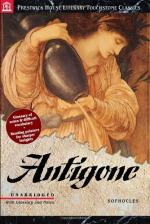|
|
Antigone Topic Tracking: Pride
Pride 1: Oedipus' sons were too prideful because they did not agree about what was best for the city of Thebes; Eteocles wanted the power to rule and so did Polyneices. Instead, Polyneices and Eteocles fought over the kingship until they had both killed each other, leaving neither man to be the ruler. Creon then takes over, since he is their uncle.
Pride 2: Antigone is too prideful and does not obey the law that King Creon has made for Theban citizens: that no one can bury Polyneices' body. Instead of listening to her ruler, Antigone decides to bury her brother anyway simply because she loves him. It is because of this pride that she is later condemned to death.
Pride 3: Creon's pride prompts him to turn Polyneices into a villain, even though he is guilty of the same crime as Eteocles. Both men wanted to have the power of ruling Thebes for themselves alone, and both men lost this battle equally. King Creon is corrupted by the same power that drove these men into battle.
Pride 4: Even a lowly Sentry can see what Creon cannot. Denying burial to a man is a crime that violates religious laws that are established by the gods. The Sentry suggests that the gods buried Polyneices, but Creon says that the gods do not honor criminals. He is too prideful to realize that he himself is a criminal for making a city law that violates a religious law.
Pride 5: The Chorus of Theban citizens states that the laws of gods are greater than laws of a city. If a city wants to be prosperous, then the king must obey the laws of the gods while governing the city. King Creon fails to do this because he makes it illegal to bury Polyneices' body, which violates the religious law making burial required for the dead. Because of his pride, Creon shall later suffer as the gods punish him for his disrespect.
Pride 6: Creon's pride also fills him not as a king superior to the gods,but also as a man superior to women. Creon is insulted at the very thought that a mere woman dared to disobey him, stating that Antigone and Ismene shall be imprisoned until the execution takes place, "not free to roam" like all women should be. Creon is so prideful as a man that he does not have any respect for women.
Pride 7: Haemon gives good advice to Creon, that the Theban citizens are upset that he is going to execute Antigone. Creon doesn't care about what Thebans have to say because of his pride saying only, "Should the city tell me how I am to rule them?" and does not listen to this wise advice. Because of his pride, Creon only cares about himself rather than the opinions of the citizens he rules.
Pride 8: Later, Creon mocks Haemon by calling him a "woman's slave" and declares that he will kill Antigone right in front of his son. This pride alienates his son, who runs away screaming that his father will never see him again. Rather than thinking about people in his family and helping them, Creon only cares about himself and does what he wants without listening to anyone's advice because he is too prideful.
Pride 9: The Chorus sings about other people who were too prideful in the past and suffered for it; one man tried to kill Danae's son and later was killed for it; one man mocked Bacchus and was torn apart by his own mother; another man crossed paths with Zeus when he could predict the future, and he was punished as well. The lesson remains that prideful people are always punished by the gods.
Pride 10: When Teiresias offers the wise advice to Creon that he must bury Polyneices' body because the gods are angry, Creon mocks him. The Theban king is too prideful to obey even the wisest of prophets, insisting that the old blind man just wants to make some money by scaring him with lies. He even insults Zeus himself by declaring that he doesn't care if the carrion birds carried pieces of flesh to Zeus' himself.
Pride 11: Creon finally puts his pride aside and listens to the Chorus' wise advice. It is difficult even then, and he obeys only because he fears the punishment that he might receive. "To yield is terrible," he says, meaning to swallow his pride and admit that he is wrong is a very difficult thing for him to do.
Pride 12: The Messenger suggests that Haemon commited suicide because his own pride stopped him from obeying the wishes of his father to execute Antigone. "The wrong choice of plans for a man/is his greatest evil," he says, meaning that Haemon should not have killed himself. The young man died because he refused to respect his Creon's authority as a his king and as his father.
Pride 13: Creon's pride is now gone, and he admits that he made a terrible mistake by not listening to anyone's advice. The only way that he has found this wisdom has been by suffering and feeling the punishment of the gods he had previously refused to respect.
Pride 14: Creon is further humbled after his wife Eurydice commits suicide as well. He accepts responsibility for what he has done and acknowledges that he has made some very bad decisions by violating religious law. Now he wants to die.
Pride 15: The Chorus mentions that "great words of haughty men" bring great punishments, as they have in the case of Creon. Too late, he learned that he was wrong, although his pride would not allow him to admit this earlier. Creon's pride is the key factor most responsible for his downfall and the suffering that will follow him for the rest of his life.




